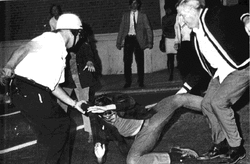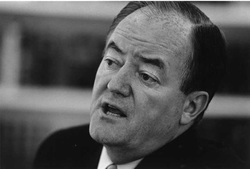
Buchanan leant over and shouted, “Hey, you’ve missed one!”
Those were the two responses to the crises of 1968 that most people are familiar with, and both are getting a big play in London 2011. In the 1960s, several conservative populists called for a take-no-prisoners answer to urban chaos: no recognition of supposed grievances, 100% support for the police, and zero tolerance for offenders. Presidential candidate George Wallace promised to hand the streets over to the cops for 24 hours, all civil liberties suspended and no questions asked. Having just witnessed my own capital city be looted by thugs and vandals, I feel considerable sympathy for this position. One’s first instinct in the midst of criminality is to go all Rambo. A good friend asked the question on Facebook, “Where is Charles Bronson when you need him?”
Leftwing commentators in the 1960s expressed far greater sympathy for the rioters than what one might find today. The Kerner Commission of 1968 blamed the disturbances entirely on racism and poverty, with little consideration for personal responsibility. It concluded that “Our nation is moving toward two societies, one black, one white – separate and unequal”, and proposed massive federal spending projects as a solution. That view, incidentally, is still popular within my own field of historical research. The consensus within the academy is that the disorder of the 1960s was a legitimate response to white racism and an unjust war, while the stunning popularity of conservative politicians like Wallace, Buchanan, or Ronald Reagan reflected an underlying mainstream fascism.
What is forgotten about 1968 is that there was a “third way” response to the violence, and it had a big constituency. It was the approach taken by Democratic presidential candidate Hubert Humphrey: toughness informed by compassion. Humphrey was a liberal before the term became submerged within radical Leftwing discourses in the 1970s – before it became synonymous with socialist economics and identity politics bullcrap. Nor did it have anything to do with obscure British philosophers: Smith and Mill probably sounded like undertakers to Hubert. Rather, it was a politics shaped by the misery of the Great Depression and the violent grandeur of the Second World War. Humphrey’s liberalism was tough and sinewy. He loved his fellow man, but he understood that part of love is censorship and reform. Man is born in sin: people used to get that.
When he accepted his party’s nomination in Chicago 1968, the same week that Mailer and Buchanan watched the cops and demonstrators duke it out in the street, Humphrey opened with the prayer of St. Francis of Assisi: “Where there is hatred, let me sow love; where there is injury, pardon; where there is doubt, faith; where there is despair, hope; where there is darkness, light.” Then he said, “Rioting, sniping, mugging, traffic in narcotics and disregard for law are the advance guard of anarchy and they must and they will be stopped. But may I say most respectfully, particularly to some who have spoken before, the answer lies in reasoned, effective action by state, local and federal authority. The answer does not lie in an attack on our courts, our laws or our Attorney General. We do not want a police state, but we need a state of law and order. And neither mob violence nor police brutality have any place in America.”
It was a complex formula, perhaps too nuanced for the angry spirit of the age. But it balanced what many citizens were looking for: a definition of law and order that keeps in check both the criminal individual and the over-mighty state. Humphrey went on to say, “Nor can there be any compromise with the right of every American who is able and who is willing to work to have a job, who is willing to be a good neighbor, to be able to live in a decent home in the neighborhood of his own choice … And it is to these rights – the right of law and order, the right of life, the right of liberty, the right of a job, the right of a home in a decent neighborhood, and the right to an education – it is to these rights that I pledge my life and whatever capacity and ability I have.”
What Humphrey meant was that law and order and social reform are not contradictions as the Marxist Left would have us believe: they are two sides of the same social contract. Peace guarantees the opportunity for progress and progress irons out the iniquities that spur disorder. It’s a forerunner of that blunter paradigm, “Tough on crime, tough on the causes of crime”. For those who, frankly, want to see some criminals get a good thrashing but who also don’t want to give up on the dream of urban renewal, this is a powerful promise. It was popular enough in 1968 to take Humphrey to within one percentage point of winning the presidency.
As we have come to expect, Britain’s political leadership has been singularly lacking throughout these riots. A few have offered jingoisms, while a former mayor has unwisely suggested that the hoodlums need love. There is a space – a wide vacuum in fact – for a reasonable statesperson to ask, “Can’t we all get along?” Most voters are conservative in that they want peace in the streets yet liberal in that they don’t want to use water cannons to get it. One solution is transformative leadership. Robert Kennedy offered something of that when he spoke in Indianapolis on the night of Martin Luther King Jr’s assassination. He said, "What we need in the United States is not division; what we need in the United States is not hatred; what we need in the United States is not violence and lawlessness, but is love, and wisdom, and compassion toward one another, and a feeling of justice toward those who still suffer within our country, whether they be white or whether they be black." He asked the crowd to go home and pray, and they did. Indianapolis was one of the few major US cities that didn’t experience riots that night. I pray that a similar recourse to reason is still possible in this crisis. In the absense of decent leadership to provide it, I shall be getting grandpa's shotgun down from the attic. To quote Pat Buchanan when asked his response to new federal gun controls: "Lock and load".

 RSS Feed
RSS Feed